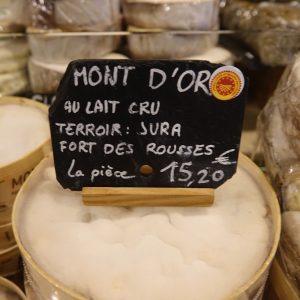In this series, we’re sitting down with the Swette Center affiliated faculty to catch up on food systems, innovation and what makes a good meal. See the rest of the series on our Food Systems Profiles page.
Read on for an interview with Peter Byck, professor of practice in the Walter Cronkite School of Journalism and Mass Communications.
Question: How did you get interested in food systems issues?
Answer: Well I’m human, so I like to eat. But my journey is film, first. I went to college for filmmaking, and it seems like every film I ever made had something to do with the environment. I made a film called Carbon Nation which is a climate change solutions movie.
In the making of that film, I discovered how much soils are part of the climate change problem and how much they can be a part of the solution. So that brought me to soils, farms, and pastures, and ultimately into the world of food and agriculture. I’ve now made ten short films about farms around the US, Canada and the UK, called Soil Carbon Cowboys.
Q: Share a glimpse of your current research and how it applies to food systems transformation.
A: When I started working on Soil Carbon Cowboys in 2013, I was working with three farmers who were really innovative in their grazing practices and pasture management. But at the time there wasn’t a lot of research about whether or not these practices were actually better — better for the soil, the animals, the farmer, the climate.
So I started asking scientists these questions and that led to this project that I’m working on now about Adaptive Multi-Paddock (AMP) grazing. Can AMP grazing make the land better, regenerate soils, and make the farmer happier? We’re looking at five pairs of farms where on one side is the AMP grazing and the other side is conventional grazing so that we can measure a whole suite of metrics and then compare between the farms.
The suite of metrics has to do with soil health, microbial activity, carbon storage, water infiltration and retention, greenhouse gas cycling, forage quantity and nutrients, animal well-being, and farmer well-being. We’ll look at the life-cycle assessment of the whole thing, and make a documentary about the story and the results.
Q: What’s an innovation in the food systems world that you’re excited about?
Easy answer — the work of Fred Provenza. He just wrote a book called Nourishment. Overall, he disagrees with the idea that all red meat is the same. He shows that animals, when given the right choices, know what to eat, and how much, and when. And the question is -- have we, as humans lost that ability from all these false signals from our food.
He works on micronutrients in food, so for example if you have a piece of the meat that was grassfed rather than grain fed, there are differences in micronutrients and phytochemicals of the meat when it gets to your plate.
Provenza also thinks about what you’re eating alongside the meat. A glass of red wine, or certain spice blends, when paired with meat may have complementary nutrients so that your body can process the nutrients and get the most out of it. There’s still a lot of research to be done and I think it’s a very exciting area to study.
Q: What’s your favorite food?
A: My favorite food is sushi, and Japanese food in general. Mexican food is a close second. With sushi, I just love raw fish and wasabi. But miso soup is my magnet. I remember the first time I had miso soup, and it was magical. I took miso soup on the road when I was filming last summer, and it was just so good, and easy to make after a long day of work.

